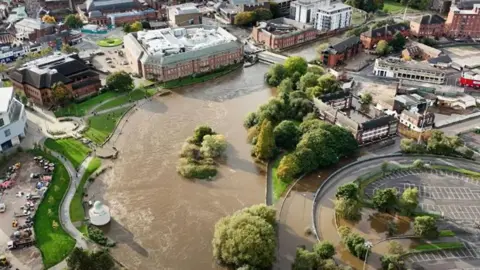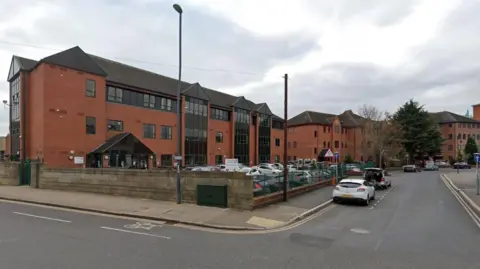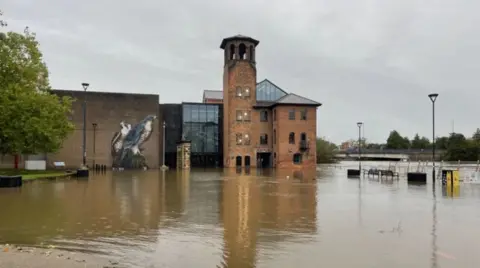City to receive £35m flood defence funding
 Derby City Council
Derby City CouncilThe next phase of a flood defence programme in Derby will finally come to fruition after millions of pounds worth of funding was approved.
The Environment Agency has confirmed £35m will be given towards the Our City Our River (OCOR) scheme which includes work to demolish office blocks in the city centre along the River Derwent to turn it into green space.
The area will be used as both a park and a natural flood defence should water burst its banks during a flood.
Derby City Council leader Nadine Peatfield told the BBC the money will protect homes and businesses as well as regenerating part of the city centre.
Property flood resilience schemes across Derbyshire, Leicestershire and Nottinghamshire, will also receive £2.5m, the Environment Agency said.
The £35m funding focuses on the opposite side of the river from the side which formed phase one of the flood defence scheme.
This included work in front of the council offices and the city's crown court.
Phase two will involve the demolition of the riverside office blocks in Stuart Street to create a new green area, designed for flood water to go around Exeter Bridge and help lower river levels through the city by making space for water.
 Google
GoogleCouncil documents describe Derby as having a long history of flooding with records dating back to 1750.
Flood records from 1931, 1932 and 1965 show extensive flooding of varying extents to Darley Abbey Mills and the centre of Derby.
The existing flood defences were constructed following the 1965 flood and run along the left bank of the River Derwent throughout Derby.
In the flood event in 2000, the existing defences were close to overtopping.
The river burst its banks in 2023 and caused widespread flooding along the eastern bank of the Derwent following Storm Babet.
 BBC/Matt Weigold
BBC/Matt WeigoldPeatfield said: "It's absolutely brilliant news for Derby we've been waiting a long time to move onto phase two [of the project].
"It finally gives us the green light to not only protect the city from the dangers of flooding but to use this opportunity to regenerate that part of the city as well.
"The plans have been there for a long time - we've known what we've needed to do but these things are all about funding.
"Flooding used to be a one-in-100 event and now it's happening every couple of years - this is the reality of climate change and we've got to be resilient and ready to tackle it."
Environment Agency chair Alan Lovell added: "With this new funding, we will work closely with the government to deliver the vital projects that are needed across the country, ensuring our investment goes to those communities who need it the most."
Follow BBC Derby on Facebook, on X, or on Instagram. Send your story ideas to [email protected] or via WhatsApp on 0808 100 2210.
